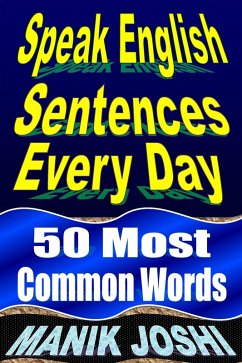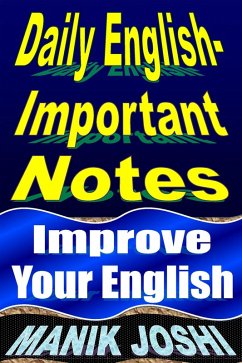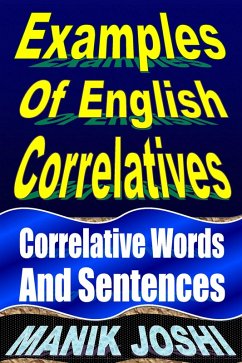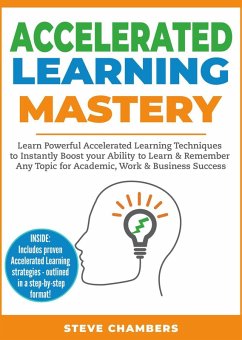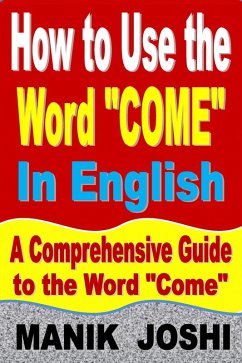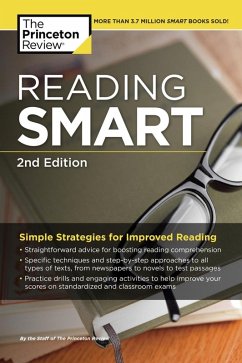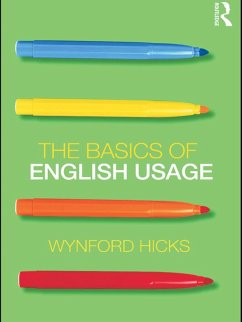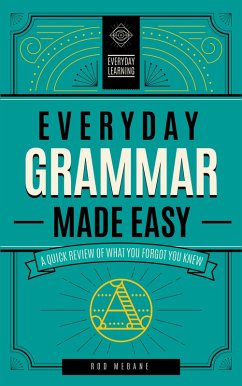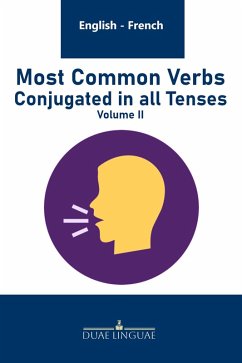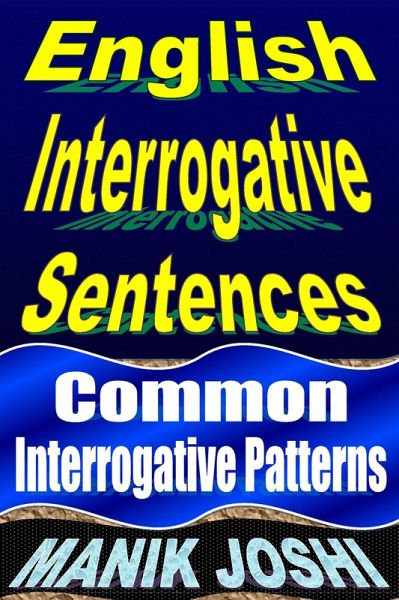
English Interrogative Sentences: Common Interrogative Patterns (English Daily Use, #2) (eBook, ePUB)

PAYBACK Punkte
0 °P sammeln!
This Book Covers The Following Topics: What are "Interrogative Sentences"? Structure (1) -- Wh-Question Word + Be/Do/Have/Modal (1A). What + Be/Do/Have/Modal (1B). When + Be/Do/Have/Modal (1C). Where + Be/Do/Have/Modal (1D). Which + Be/Do/Have/Modal (1E). Who + Be/Do/Have/Modal (1F). Whom + Be/Do/Have/Modal (1G). Whose + Be/Do/Have/Modal (1H). Why + Be/Do/Have/Modal (1I). How + Be/Do/Have/Modal Structure (2) -- Wh-Question Word + Word/Words + Be/Do/Have/Modal (2A). What + Word/Words + Be/Do/Have/Modal (2B). When + Word/Words + Be/Do/Have/Modal (2C). Where + Word/Words + Be/Do/Have/Modal (2D). ...
This Book Covers The Following Topics: What are "Interrogative Sentences"? Structure (1) -- Wh-Question Word + Be/Do/Have/Modal (1A). What + Be/Do/Have/Modal (1B). When + Be/Do/Have/Modal (1C). Where + Be/Do/Have/Modal (1D). Which + Be/Do/Have/Modal (1E). Who + Be/Do/Have/Modal (1F). Whom + Be/Do/Have/Modal (1G). Whose + Be/Do/Have/Modal (1H). Why + Be/Do/Have/Modal (1I). How + Be/Do/Have/Modal Structure (2) -- Wh-Question Word + Word/Words + Be/Do/Have/Modal (2A). What + Word/Words + Be/Do/Have/Modal (2B). When + Word/Words + Be/Do/Have/Modal (2C). Where + Word/Words + Be/Do/Have/Modal (2D). Which + Word/Words + Be/Do/Have/Modal (2E). Who + Word/Words + Be/Do/Have/Modal (2F). Whom + Word/Words + Be/Do/Have/Modal (2G). Whose + Word/Words + Be/Do/Have/Modal (2H). Why + Word/Words + Be/Do/Have/Modal (2I). How + Word/Words + Be/Do/Have/Modal Structure (3) -- Wh-Question Word + Main Verb (Present or Past) Structure (4) - Interrogatives Sentences - Be/Do/Have/Modal (4A). Interrogatives Starting From - Am, Is, Are, Was, Were (4B). Interrogatives Starting From - Do, Does, Did (4C). Interrogatives Starting From - Have, Has, Had (4D). Interrogatives Starting From - Modal Verbs Structure (5) -- Question Tags Structure (6) -- What if Structure (7) - How Long/How Much/How Many Structure (8) -- Wh-Question Word + To + Verb Word Structure (9) - "What About" and "How About" Structure (10) - Alternative Questions Structure (11) - Indirect Questions Formation of Interrogatives from Affirmatives Exercises Sample This: What are "Interrogative Sentences"? Interrogative sentences are used to ask questions. An interrogative sentence ends with a question mark. The most common interrogative words are as follows: What, When, Where, Which, Who, Whom, Whose, Why, How Interrogative words and what they refer: What - refers to 'specific information' or confirmation/repetition When - refers to 'at what time' or 'on what occasion' Where - refers to 'in what place, position or situation' Which - refers to 'choice or alternative' Who - refers to 'identity' of a subject (person/people) Whom - refers to 'identity' of an object (person/people) Whose - refers to 'who something belongs to' Why - refers to 'reason, explanation or purpose' How - refers to 'way or manner', 'condition or quality' These words are called 'Wh-question words' because all these words contain the letter 'w' and 'h'. All these words (except 'how') even start from 'Wh'. NOTE: The following words are also used to ask questions: Whatever, Whenever, Wherever, Whoever These forms show 'surprise, confusion, or emphasis. Besides 'Wh-question words', Auxiliary Verbs 'Be', 'Do', 'Have', and 'Modal Verbs' are also used to form interrogative sentences. Following is the list of auxiliary and modal verbs: Auxiliary Verb-- Be-- Am, Is, Are, Was, Were Auxiliary Verb-- Do-- Do, Does, Did Auxiliary Verb-- Have-- Have, Has, Had Modal Verbs-- May, Might, Can, Could, Will, Would, Shall, Should, Must, Need, Used (To), Ought (To), Dare You can begin sentences with these verbs to form Yes/No interrogative sentences. (1A). What + Be/Do/Have/Modal What is a good pet to give a five-year-old child? What is a long way away? What is a reasonable grocery budget? What is age got to do with it? What is all that? What is Australia's national food? What is behind the nation's food shortages? What is better for your company: happy staff or short-term profits?
Dieser Download kann aus rechtlichen Gründen nur mit Rechnungsadresse in A, B, CY, CZ, D, DK, EW, E, FIN, F, GR, H, IRL, I, LT, L, LR, M, NL, PL, P, R, S, SLO, SK ausgeliefert werden.




